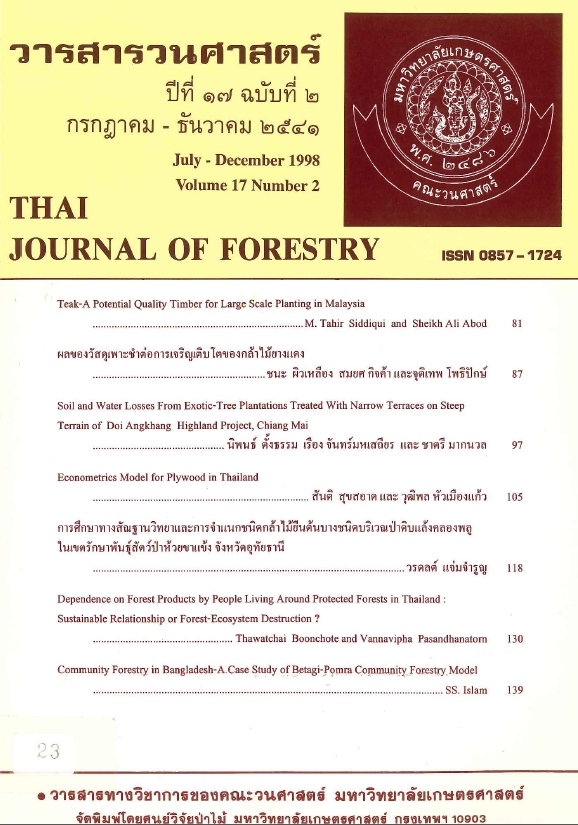COMMUNITY FORESTRY IN BANGLADESH - A CASE STUDY OF BERAGI - POMRE COMMUNITY FORESTRY MODEL
Main Article Content
บทคัดย่อ
A case study of Betagi-Pomta Community Forestry Project was done at Chittagong district in Bangladesh. The project started functioning at Betagi with 82 settlers each alloed 1.62 ha of land in 1979 and Pomra with 152 settlers each alloted 1.62 ha of land in 1980. The main objective of the study was to extend the knowledge gained from the Betagi-Pomra experence in unproductive hilly areas to other areas in the country. A complete enumeration of the settlers at Betagi and sampling of the settlers at Pomra were carried out in both 1985 and 1994. Data on family members, land utilization, growing stock, income, expenditure, financial assistance, marketing, training, etc., were colleted in a designed questionnaire. The land expectation value was estimated to be Tk. 46000 at Betagi and Tk. 43333˙ at Pomra indicating prospective land use pattern. The input-output ratio stood at about two at Betagi and two at Pomra without considering future cost and benefit of planted stock. The internal rate of return was found to be 104 % at Betagi and 90 % at Pomra. Annual farm farm income per family in 1994 was increased to more than double both at Betagi and Pomra compared to family income in 1985. In view of the estimated characteristics, the Betagi-Pomra model porvided employment opportunities, conversion to denuded hills into green crops, ideal cropping pattern, proper market mechanism, community stability, self-sufficiency, decrease in social crimes, etc. The model may be replicated to other denuded and unproductive hilly areas in Bangladesh.
Downloads
Article Details

อนุญาตภายใต้เงื่อนไข Creative Commons Attribution-NonCommercial-NoDerivatives 4.0 International License.
ข้าพเจ้าและผู้เขียนร่วม (ถ้ามี) ขอรับรองว่า ต้นฉบับที่เสนอมานี้ยังไม่เคยได้รับการตีพิมพ์และไม่ได้อยู่ในระหว่างกระบวนการพิจารณาตีพิมพ์ลงในวารสารหรือสิ่งตีพิมพ์อื่นใด ข้าพเจ้าและผู้เขียนร่วม (ถ้ามี) ยอมรับหลักเกณฑ์และเงื่อนไขการพิจารณาต้นฉบับ ทั้งยินยอมให้กองบรรณาธิการมีสิทธิ์พิจารณาและตรวจแก้ต้นฉบับได้ตามที่เห็นสมควร พร้อมนี้ขอมอบลิขสิทธิ์ผลงานที่ได้รับการตีพิมพ์ให้แก่วารสารวนศาสตร์ คณะวนศาสตร์ มหาวิทยาลัยเกษตรศาสตร์ กรณีมีการฟ้องร้องเรื่องการละเมิดลิขสิทธิ์เกี่ยวกับภาพ กราฟ ข้อความส่วนใดส่วนหนึ่ง หรือ ข้อคิดเห็นที่ปรากฏในผลงาน ให้เป็นความรับผิดชอบของข้าพเจ้าและผู้เขียนร่วม (ถ้ามี) แต่เพียงฝ่ายเดียว และหากข้าพเจ้าและผู้เขียนร่วม (ถ้ามี) ประสงค์ถอนบทความในระหว่างกระบวนการพิจารณาของทางวารสาร ข้าพเจ้าและผู้เขียนร่วม (ถ้ามี) ยินดีรับผิดชอบค่าใช้จ่ายทั้งหมดที่เกิดขึ้นในกระบวนการพิจารณาบทความนั้น”


